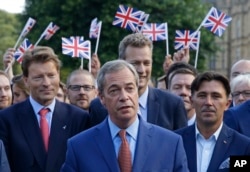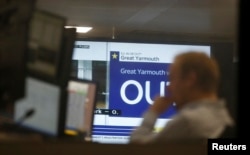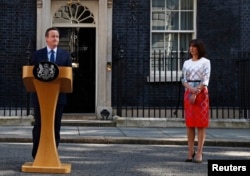For once, media hyperbole matches reality. Britain’s vote to leave the European Union has sent shockwaves around the world with the initial one hitting the financial markets. The British pound crashed to levels not seen since 1985 and billions of dollars are being wiped off the value of British and European companies.
With the markets plunging and a majority of Britons voting against the EU, Prime Minister David Cameron announced he would resign but remain as a caretaker until Britain’s ruling Conservative Party selected a replacement in the next three months.
Will Brexit trigger exodus?
Who will replace him isn’t the most important question following the referendum, although it will likely trigger a civil war within the Conservative Party. Across Europe, politicians are asking whether the European Union can survive Brexit or whether the British vote set in motion dynamics that will see other member states leave too?
German Foreign Minister Frank-Walter Steinmeier greeted the result with dismay. “This is a sad day for Britain and for the EU,” he said. But that view isn't shared by Europe’s far-right nationalists. Even before the Brexit vote populists in Denmark, France, Italy, the Netherlands and Sweden were pushing for their own referendums. They are likely now to be emboldened.
France's far-right politician Marine Le Pen tweeted that the vote is a “victory for liberty.”
“What doesn’t kill you, makes you stronger,” said European Council President Donald Tusk as he sought to put a brave face on the result. He added that the EU’s remaining 27 members “are determined to keep our unity. Europe is the framework for our common future.” But he admitted there would have to be serious reflection on what the vote means for how the European Union functions.
Not only is the EU’s future being questioned. To some, the British union's own survival is cast into doubt.
Scotland, Ireland
Despite British Leave campaigner Nigel Farage greeting the result as “dawn…breaking on an independent United Kingdom,” Scottish nationalists warned they are likely now to seek another referendum – one to break with the English. Scotland massively backed the Remain camp with 62 percent of the Scots voting to stay in the EU.
In Northern Ireland, the only part of Britain to share a land border with another EU country, the reaction from the Irish Republican party Sinn Fein was immediate and sharp. Party chairman Declan Kearney warned that the British government had “forfeited any mandate to represent the interests of people here in the north of Ireland in circumstances where the north is dragged out of Europe as a result of a vote to leave.”
His party colleague and Northern Ireland’s deputy First Minister, Martin McGuinness, called for a border poll on a united Ireland.
As politicians and markets took in the result, Peter Mandelson, a British Labour Party politician and chairman of the strategic advisory firm Global Counsel, said the next few years will be full of uncertainty and difficulty for Britain and Europe. “It will take two years for the British government to negotiate with our erstwhile partners. It will take many more years for negotiations on Britain’s future relations with Europe,” he said.
He argued the period of uncertainty should be shortened as much as possible, saying the British government, whoever leads it, should trigger the formal process for the divorce as soon as possible.
Formal divorce
Cameron, announcing his resignation early Friday, said he would leave it to his replacement to decide when to set in hand the formal negotiations for the divorce. Analysts said the prospects are that a new Conservative government will be much more anti-EU in tone and that in turn could lead to much more acrimonious talks. EU leaders and officials warned in the run-up to the referendum that Britain would have to pay a price for departure – if for no other reason than to deter any other members considering an exit.
For the British government—and governments across Europe—the more immediate concerns are being focused on the huge economic fallout from the referendum. Carl Weinberg of High Frequency Economics, an investment consultancy, warned clients Thursday that if “sterling denominated assets—like gilts, corporate bonds and equities— drop like a stone immediately…a dynamic could trigger serious losses at global financial institutions.”
Market scrutiny
With financial turmoil now raging, EU countries will come under intense market scrutiny and some analysts have expressed concern that debt-ridden countries like Portugal, Spain, Greece and Italy will come under increased pressure.
Britain’s Financial Times newspaper warned Friday: “Brexit will harm the EU’s cohesion, confidence and international reputation,” undermining the West’s liberal political and economic order.
Former British prime minister Tony Blair told broadcaster Sky News there will be “very big consequences.” He dubbed the vote result a “tragedy,” saying that Leave campaigners are “trying to take the country back to a world that doesn’t exist anymore.” He cautioned: “You can ride the anger of populism but it doesn’t supply the answers” to the problems and challenges thrown up by globalization.







